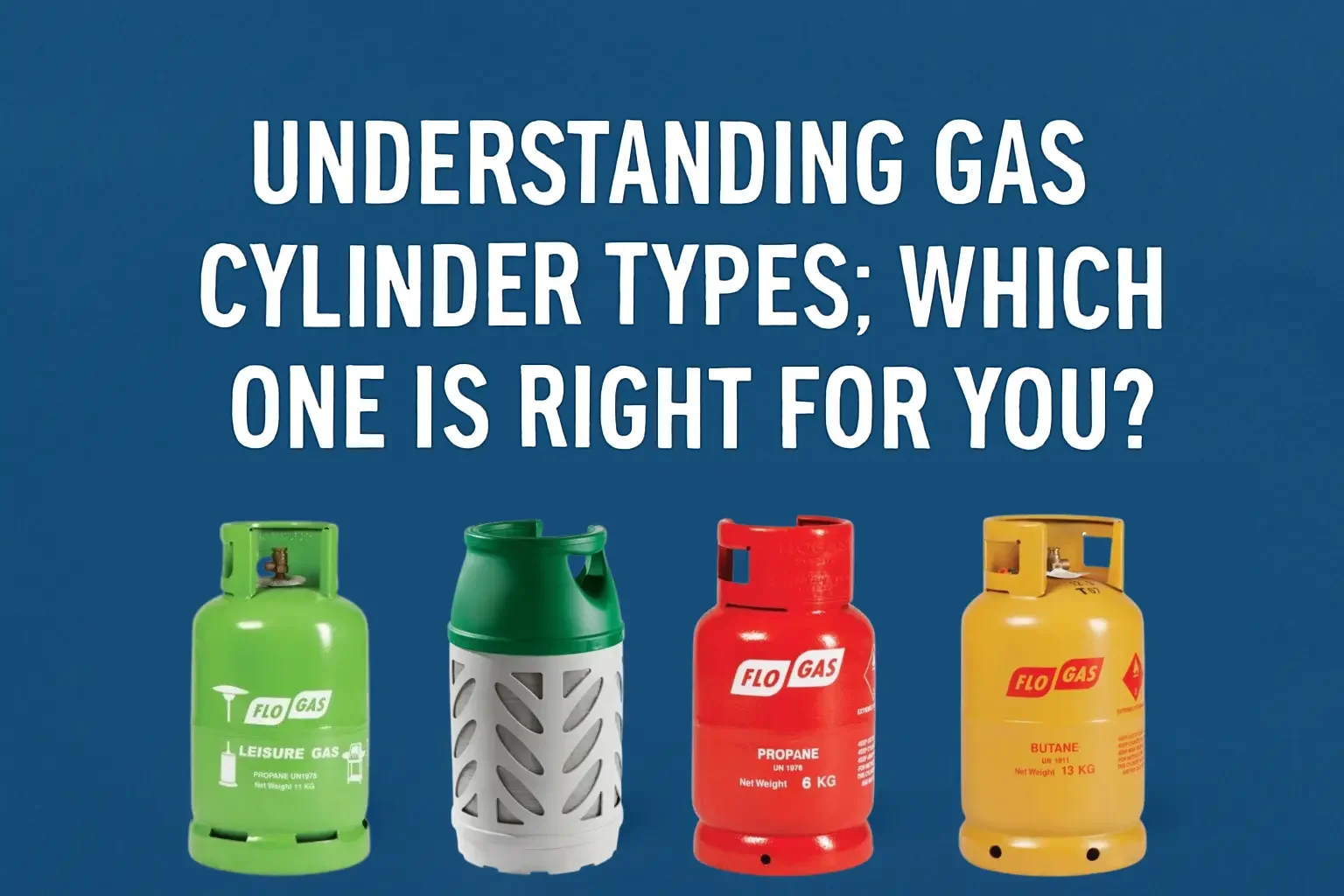Understanding Gas Cylinder Types: Which One is Right for You?
Gas cylinders play a vital role in modern life, powering everything from household appliances to industrial equipment. Whether you're using it for cooking, heating, or even in a professional setting, selecting the right gas cylinder can make all the difference in ensuring efficiency, safety, and cost-effectiveness. But with so many different types of gas cylinders available, how do you know which one is right for you?
What Is a Gas Cylinder?
A gas cylinder is a pressurized container used to store and transport gases such as propane, butane, oxygen, and more. Gas cylinders are designed to handle gases under high pressure, ensuring safe usage in domestic, commercial, and industrial settings. Depending on the gas and the specific application, these cylinders can vary in size, material, and valve type.
Understanding the types of gas cylinders is crucial to ensuring that you get the right one for your needs.
Different Types of Gas Cylinders
Gas cylinders come in a wide variety of types, designed to store different kinds of gases for a range of applications. Let’s dive into some of the most common types:
Propane Gas Cylinders
Propane gas cylinders are commonly used for heating, cooking, and outdoor activities like grilling. These cylinders are made of steel or aluminum and are designed to safely store propane under pressure. The size of propane cylinders can vary, but the 5kg and 13kg cylinders are the most popular for household use.
Why Choose Propane?
Propane is highly versatile, can be used both indoors and outdoors, and is a great energy source for heating in colder climates.Butane Gas Cylinders
Butane gas cylinders are generally smaller than propane cylinders and are often used for portable appliances like camping stoves, heaters, or small cooking devices. These cylinders are also commonly used for portable BBQs and even in some lighters.
Why Choose Butane?
Butane gas is ideal for warmer weather because it vaporizes more efficiently in higher temperatures. It’s also lighter and more compact than propane, making it perfect for portability.Oxygen Gas Cylinders
Oxygen gas cylinders are designed to store oxygen at high pressure. These cylinders are commonly used in medical settings, industrial applications, and welding. Oxygen cylinders are made from durable materials such as aluminum or steel to withstand high pressure.
Why Choose Oxygen?
Oxygen cylinders are essential in medical emergencies and are a critical component of life-saving equipment. They are also used for welding and cutting metals due to the high flame temperature that oxygen allows.Nitrogen Gas Cylinders
Nitrogen gas cylinders are used to store nitrogen, an inert gas that has no color, taste, or smell. Nitrogen is commonly used in industrial applications, such as in the food and beverage industry for preservation, as well as in the pharmaceutical industry.
Why Choose Nitrogen?
Nitrogen is perfect for applications that require an inert atmosphere, and it is often used in gas mixtures for specialized environments.Acetylene Gas Cylinders
Acetylene gas cylinders are primarily used in welding and cutting operations. Acetylene burns at a very high temperature, making it ideal for tasks such as brazing, welding, and metal cutting.
Why Choose Acetylene?
Acetylene is the go-to gas for high-temperature flame applications and is used in numerous industries, including automotive and metalworking.
Factors to Consider When Choosing a Gas Cylinder
When selecting the right gas cylinder, there are several factors to consider to ensure you are getting the best one for your needs:
Type of Gas
The first thing to determine is the type of gas you require. For instance, propane gas cylinders are great for heating, while oxygen cylinders are essential for medical or industrial applications. Make sure you choose a gas cylinder that fits the needs of your specific application.
Cylinder Size
Gas cylinders come in various sizes, from small portable cylinders to large industrial tanks. Consider how much gas you need and how often you’ll need to refill it. For household use, smaller cylinders like 5kg or 13kg may suffice, while larger operations may require bigger tanks.
Material
Most gas cylinders are made from either steel or aluminum. Steel cylinders tend to be more durable and are used for higher-pressure gases, while aluminum cylinders are lighter and easier to transport.
Safety Features
When selecting a gas cylinder, make sure it comes with the necessary safety features, such as a pressure relief valve, a regulator, and proper sealing. Safety is paramount when dealing with high-pressure gases, so always prioritize quality and reliability.
Compatibility with Appliances
Make sure the gas cylinder is compatible with the appliances you intend to use it with. For example, certain camping stoves might only work with smaller butane cylinders, while larger barbecue grills require propane.
How to Maintain Your Gas Cylinder
Proper maintenance is key to ensuring the safe and efficient use of your gas cylinder. Here are a few maintenance tips:
Inspect Regularly: Always check your cylinder for any signs of wear or damage. If you notice any corrosion, dents, or cracks, it’s important to replace the cylinder.
Store Correctly: Gas cylinders should always be stored in a cool, dry place, away from direct sunlight or heat sources. Never store cylinders in closed spaces or in vehicles.
Use the Right Regulator: Always use the correct regulator for your gas cylinder. A regulator controls the flow of gas and ensures it’s delivered at the right pressure.
Keep Valves Closed: When the gas cylinder is not in use, make sure to shut the valve to avoid leaks or unnecessary pressure buildup.
Gas Cylinder FAQ
1. Can I use a propane gas cylinder for a barbecue grill?
Yes, propane gas cylinders are perfect for outdoor grilling. However, always ensure that the cylinder is compatible with your grill, and use the right regulator for safe operation.
2. Are butane and propane gas cylinders interchangeable?
No, butane and propane have different properties and require specific regulators. Butane is best for warmer climates, while propane performs well in cold weather.
3. How do I know when my gas cylinder is empty?
Most gas cylinders come with a gauge that shows the remaining gas. If there’s no gauge, you can check by weighing the cylinder or by using the "hot water test"—pour warm water along the side of the cylinder and feel for a cold spot, which indicates the level of gas.
4. Are gas cylinders safe?
Yes, as long as they are used properly and maintained regularly. Always check for leaks, store cylinders safely, and use the correct regulators for your appliances.
5. How long does a gas cylinder last?
The duration of a gas cylinder depends on the size of the cylinder and the frequency of use. A typical 13kg propane cylinder might last anywhere from a few weeks to a couple of months for everyday household use.
Conclusion
Choosing the right gas cylinder for your needs is an essential decision that can impact your safety, convenience, and energy efficiency. Whether you're using it for cooking, heating, or industrial applications, there’s a gas cylinder designed specifically for your needs. From propane and butane to oxygen and nitrogen, understanding the different types of gas cylinders available will ensure you make the right choice. Remember to consider factors like the type of gas, cylinder size, material, and safety features to find the best option. Keep your gas cylinder well-maintained, and always follow safety guidelines to ensure it serves you well for years to come.

